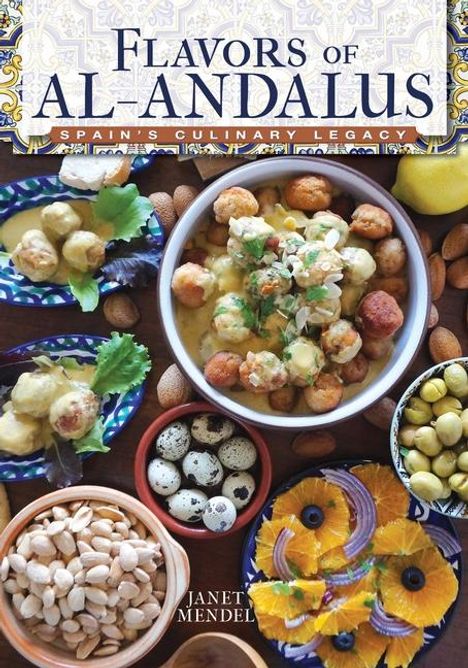Janet Mendel: Flavors of Al-Andalus, Gebunden
Flavors of Al-Andalus
(soweit verfügbar beim Lieferanten)
- Verlag:
- Hippocrene Books, 08/2025
- Einband:
- Gebunden
- Sprache:
- Englisch
- ISBN-13:
- 9780781814560
- Artikelnummer:
- 11923068
- Umfang:
- 288 Seiten
- Gewicht:
- 990 g
- Maße:
- 254 x 178 mm
- Stärke:
- 38 mm
- Erscheinungstermin:
- 12.8.2025
- Hinweis
-
Achtung: Artikel ist nicht in deutscher Sprache!
Klappentext
"This is a fascinating book about history but not stuck in time. Janet is a time traveler, telling us stories about the past but always making them relevant, bringing the world of al-Andalus--a region very close to my heart--to our kitchens today."
--Chef José Andrés
This cookbook explores the deep and
lasting influences that Islamic culture has left on modern Spanish cooking. Muslims first
invaded the Iberian peninsula in 711 CE, crossing the narrow straits from North
Africa and taking over most of what would become the country of Spain. The
newly-conquered land initially under the caliphate of Damascus, was called
al-Andalus and at one time covered almost the entire Iberian peninsula.
At his palace of
Medina Azahar around 950 CE, the Caliph of Córdoba dined on refined dishes of
almond cream, lamb cooked with spices, eggplant stuffed with meat and scented
with cinnamon, and carrot salad with sprigs of mint. The kingdoms of
al-Andalus lasted eight centuries, ending in 1492 with the fall of Granada.
Islamic culture left a deep mark on the country that became Spain--on language,
science, literature and most certainly on cuisine.
Author and Spanish cooking expert Janet Mendel tells the story of the
Moorish influence on Spanish cooking through 120 recipes for modern-day dishes,
from salads and vegetables to fish, poultry and meat to sweets and pastries,
that trace their heritage to foods served in medieval times. During periods of convivencia, the different communities--Muslim, Sephardic-Jewish, and Mozárabe Christian--lived together in friendly cooperation, shopping at the same markets, trading commodities, and sharing each other's holidays and festive foods. The interweaving of cultures embedded the foodways of al-Andalus deeply in Spanish life.
Dishes from this
era include exotic spices such as saffron, the use of fruits and almonds with
savory dishes, and honeyed sweets and pastries. The flavors of al-Andalus live
on in modern Spanish cooking and are what makes Spain's cuisine distinctive
from the rest of Europe.
Sample recipes:
- White Gazpacho with Grapes (Ajo Blanco con Uvas)
- Fried Eggplant with Molasses (Berenjena Frita con Miel de Caña)
- Monkfish with Raisins and Pine Nuts (Rape al Mozarabe)
- Chicken in Almond Sauce (Pollo en Pepitoria)
- Beef Stew with Artichokes (Cordero con Alcachofas)
- Almond Cream Pudding (Sopa de Almendras)
- Crispy Olive Oil Cookies (Tortas de Aceite)


